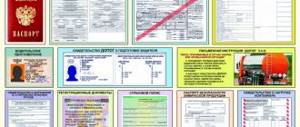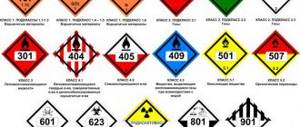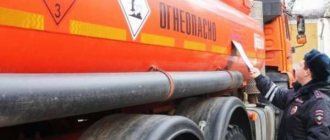Cargo transportation related to the transportation of substances classified as hazardous is strictly controlled and regulated by law. The thing is that, unlike ordinary cargo, hazardous substances, if the carrier deviates from the established standards, in the event of an unforeseen situation, will not only be able to cause enormous harm to the direct carrier of the product and bystanders, but also become the primary source of a global catastrophe that threatens the environmental situation, health, and often the lives of people.
There is a fine for violating the rules for transporting dangerous goods.
State standards oblige the cargo carrier’s legal documentation to ensure the maximum level of safety for the transported goods, and to issue special permits for the transit of products. For non-compliance with safety and lack of obligatory documentation, the cargo carrier is subject to significant penalties. In this article we will talk about the circumstances under which a fine is imposed for the transportation of dangerous goods by road, and we will consider the legal documents that oversee the transportation of unsafe categories of goods.
Laws defining standards for the transportation of exhaust gases
Unsafe products, regardless of their hazard class, are not prohibited by law from being transported. The only condition for transporting dangerous goods is that they are transported in accordance with the standards established by law, which ensure that unforeseen situations are kept to a minimum. To understand what liability a cargo carrier faces for violating the rules for transporting hazardous substances, it is necessary to familiarize yourself with the regulations relating to the transportation of products in this category.
The fundamental regulation coordinating the movement of dangerous goods is Article 12.21.2 of the Code of Administrative Offenses of the Russian Federation in the latest edition of the code dated May 2021. The document stipulates the penalties provided for non-compliance with certain rules for transporting harmful substances by road. Cargo transportation of exhaust gases by other modes of transport, with the exception of automobiles, is sanctioned by articles of the code 11.14 and 8.19. Additionally, legal standards can be adjusted by auxiliary domestic standards approved at the legislative level. These may be orders, annexes or regulations that regulate the correct organization of the movement of substances of a specific type.
What is the fine for?
The legislation contains Article 12 21 “Violation of the rules for the transportation of goods.” In this case, the driver who transports cargo with certain deviations will be punished. Generally, penalties are applied in the following cases:
- If cargo is being transported and there is no special equipment for this, for example, chains, then the driver will have to pay a decent amount for the violation.
- The same thing awaits him in the absence of the necessary documents for the cargo.
- When the weight of the cargo exceeds the permissible dimensions, then you will also have to pay a round sum of money.
- Punishment will also follow if the driver transported substances dangerous to human life, especially if there is no special training.
These are not all the violations for which you can get a fine, in fact there are many more, but the main ones are listed above.
Responsibility for illegal movement of exhaust gas
Sanctions for transporting dangerous goods if their movement does not comply with established rules vary depending on the type of violation. If the cargo carrier’s documentation is not officially documented, or the transit is carried out with incomplete compliance with all the rules established by law, responsibility for the incident may be assigned to the driver, the company implementing the transportation, or the customer of the services. The legislation provides for the following types of penalties for transporting exhaust gases in violation of transportation rules:
- financial penalty in the form of a fine;
- confiscation of property: mainly the vehicle and transported products;
- a ban on driving a specific type of vehicle for a period prescribed by law;
- criminal penalty.
The traffic police will be able to fine you for transporting dangerous goods on highways in an improper manner, and the fines will vary depending on the seriousness of the offense. Not only the entity directly transporting the goods, but also the goods transport company, as well as a legal entity authorized to control the transit delivery of products will be responsible for the incorrect movement of dangerous goods.
Section 12.21.2 of the code provides for the following financial penalties associated with the absence of certain papers or violation of the technical regulations:
- The absence of papers required for the transportation of unsafe substances provides for a fine in the range of one hundred to one hundred and fifty thousand in national currency for the direct carrier, from five to ten thousand units for the official entity. In this case, the trucking company may be punished for a larger amount, starting from one hundred and fifty thousand, with the upper limit of the accrual reaching two hundred and fifty thousand rubles. These penalties are applicable only in the absence of documents that are not licensing approvals, for the lack of which the punishment has more stringent parameters.
- If the violation concerns traffic regulations, then the penalties are two and a half, twenty and five hundred thousand rubles for the driver, official and company, respectively.
- Deviations from generally accepted requirements for the technical condition of vehicles transporting unsafe goods are punishable by a fine of thirty to fifty thousand rubles, and the sanction is applied to the entrepreneur who is the owner of the vehicle. Additionally, officials and legal responsible persons may be fined up to thirty and one hundred thousand rubles, respectively.
Fine for violating the rules for transporting goods, towing, transporting people
01.01.2020
We will not dwell on the transportation of goods, but will pay attention to Article 12.23 “Violation of the rules for the transportation of people.”
For transporting children under 12 years of age in the back seat, as well as in the front seat of a car in the absence of a special child restraint device, a fine of 3,000 rubles is imposed. And a fine of 1,000 rubles for those who like to ride a friend in the trunk, in a caravan trailer, and so on.
Text of Article 12.21, 12.21.1, 12.21.2, 12.21.3, 12.23, 11.14.1. Code of Administrative Offences.
Article 12.21 Violation of cargo transportation rules and towing rules.
1. Violation of the rules for the carriage of goods, as well as the rules of towing.
A warning or a fine of 500 rubles.
Article 12.21.1 . Violation of the “rules” of movement of a heavy and (or) large vehicle.
1. Movement of a heavy and (or) large-sized vehicle exceeding the permissible dimensions of the vehicle by no more than 10 centimeters without a special permit, or exceeding the dimensions specified in a special permit by no more than 10 centimeters, or exceeding the permissible weight of the vehicle means or permissible load on a vehicle axle by more than 2, but not more than 10 percent without a special permit, or with an excess of the vehicle weight or load on a vehicle axle specified in a special permit by more than 2, but not more than 10 percent .
A fine for the driver in the amount of 1000 to 1500 rubles; for officials responsible for transportation - from 10,000 to 15,000 rubles; for legal entities - from 100,000 to 150,000 rubles, and in the case of recording an administrative offense using special technical means operating in automatic mode, having the functions of photography, filming, video recording - for the owner (owner) of the vehicle in the amount of 150,000 rubles.
2. Movement of a heavy and (or) large vehicle exceeding the permissible dimensions of the vehicle by more than 10, but not more than 20 centimeters, or exceeding the permissible weight of the vehicle or the permissible load on the axle of the vehicle by more than 10, but not more than 20 percent without special permission.
A fine for the driver in the amount of 3,000 to 4,000 rubles; for officials responsible for transportation - from 25,000 to 30,000 rubles; for legal entities - from 250,000 thousand to 300,000 rubles, and in the case of recording an administrative offense using special technical means operating automatically, having the functions of photography, filming, video recording - for the owner (owner) of the vehicle in the amount of 300,000 rubles.
3. Movement of a heavy and (or) large vehicle exceeding the permissible dimensions of the vehicle by more than 20, but not more than 50 centimeters, or exceeding the permissible weight of the vehicle or the permissible load on the axle of the vehicle by more than 20, but not more than 50 percent without special permission.
A fine for the driver in the amount of 5,000 to 10,000 rubles or deprivation of rights for a period of two to four months; for officials responsible for transportation - from 35,000 to 40,000 rubles; for legal entities - from 350,000 to 400,000 rubles, and in the case of recording an administrative offense using special technical means operating in automatic mode, having the functions of photography, filming, video recording - for the owner (owner) of the vehicle in the amount of 400,000 rubles.
4. Movement of a heavy and (or) large vehicle exceeding the dimensions specified in the special permit by more than 10, but not more than 20 centimeters, or exceeding the weight of the vehicle or the load on the axle of the vehicle specified in the special permit by an amount more than 10, but not more than 20 percent.
A fine for the driver in the amount of 3,000 to 3,500 rubles; for officials responsible for transportation - from 20,000 to 25,000 rubles; for legal entities - from 200,000 to 250,000 rubles, and in the case of recording an administrative offense using special technical means operating automatically, having the functions of photography, filming, video recording - for the owner (owner) of the vehicle in the amount of 250,000 rubles.
5. Movement of a heavy and (or) large vehicle exceeding the dimensions specified in the special permit by more than 20, but not more than 50 centimeters, or exceeding the weight of the vehicle or the load on the axle of the vehicle specified in the special permit by an amount more than 20, but not more than 50 percent.
A fine for the driver in the amount of 4,000 to 5,000 rubles or deprivation of rights for a period of two to three months; for officials responsible for transportation - from 30,000 to 40,000 rubles; for legal entities - from 300,000 to 400,000 rubles, and in the case of recording an administrative offense using special technical means operating in automatic mode, having the functions of photography, filming, video recording - for the owner (owner) of the vehicle in the amount of 400,000 rubles.
6. Movement of a heavy and (or) large vehicle exceeding the permissible dimensions by more than 50 centimeters without a special permit, or exceeding the dimensions specified in a special permit by more than 50 centimeters, or exceeding the permissible weight of the vehicle or permissible load on the vehicle axle by more than 50 percent without a special permit, or with an excess of the vehicle weight or the load on the vehicle axle specified in the special permit by more than 50 percent.
A fine for the driver in the amount of 7,000 to 10,000 rubles or deprivation of rights for a period of four to six months; for officials responsible for transportation - from 45,000 to 50,000 rubles; for legal entities - from 400,000 to 500,000 rubles, and in the case of recording an administrative offense using special technical means operating in automatic mode, having the functions of photography, filming, video recording - for the owner (owner) of the vehicle in the amount of 500,000 rubles.
7. Violation of the rules for the movement of heavy and (or) large vehicles, except for the cases provided for in “parts 1” - “6” of this article.
A fine for the driver of the vehicle in the amount of 1000 to 1500 rubles; for officials responsible for transportation - from 5,000 to 10,000 rubles; for legal entities - from 50,000 to 100,000 rubles.
8. Provision by the shipper of inaccurate information about the weight or dimensions of the cargo in the documents for the transported cargo or failure to indicate in the waybill when transporting large-sized or heavy cargo information about the number, date or validity period of the special permit or about the route of transportation of such cargo, if this entailed a violation provided for “part 1”, “2” or “4” of this article.
Fine for citizens in the amount of 1,500 to 2,000 rubles; for officials - from 15,000 to 20,000 rubles; for legal entities - from 200,000 to 300,000 rubles.
9. Provision by the shipper of inaccurate information about the weight or dimensions of the cargo in the documents for the transported cargo or failure to indicate in the waybill when transporting large-sized or heavy cargo information about the number, date or validity period of the special permit or about the route of transportation of such cargo, if this entailed a violation provided for “part 3”, “5” or “6” of this article.
Fine for citizens in the amount of 5,000 rubles; for officials - from 25,000 to 35,000 rubles; for legal entities - from 350,000 to 400,000 rubles.
10. Exceeding the permissible weight of the vehicle and (or) the permissible load on the axle of the vehicle, or the weight of the vehicle and (or) the load on the axle of the vehicle specified in the special permit, or the permissible dimensions of the vehicle, or the dimensions specified in the special permit , legal entities or individual entrepreneurs who loaded the cargo into the vehicle.
Fine for individual entrepreneurs in the amount of 80,000 to 100,000 rubles; for legal entities - from 250,000 to 400,000 rubles.
11. Failure to comply with the requirements prescribed by “road signs” prohibiting the movement of vehicles whose total actual weight or axle load exceeds those indicated on the road sign, if the movement of such vehicles is carried out without special permission.
A fine of 5,000 rubles.
Note. For administrative offenses provided for in this article, persons carrying out entrepreneurial activities without forming a legal entity bear administrative liability as legal entities.
Article 12.21.2 . Violation of the rules for transporting dangerous goods.
1. Transportation of dangerous goods by a driver who does not have a certificate of training for drivers of vehicles transporting dangerous goods, a certificate of approval of the vehicle for the transportation of dangerous goods, a special permit or an emergency card of the hazard information system provided for by the rules for the transportation of dangerous goods, as well as the transportation of dangerous goods cargo on a vehicle whose design does not comply with the requirements of the rules for the transportation of dangerous goods or which lacks elements of a hazard information system or equipment or means used to eliminate the consequences of an incident during the transportation of dangerous goods, or non-compliance with the conditions for the transportation of dangerous goods provided for by these rules.
A fine for the driver in the amount of 2,000 to 2,500 rubles or deprivation of the right to drive vehicles for a period of four to six months; for officials responsible for transportation - from 15,000 to 20,000 rubles; for legal entities - from 400,000 to 500,000 rubles.
2. Violation of the rules for the transportation of dangerous goods, except for the cases provided for in Part 1 of this article.
A fine for the driver in the amount of 1000 to 1500 rubles; for officials responsible for transportation - from 5,000 to 10,000 rubles; for legal entities - from 150,000 to 250,000 rubles.
Article 12.21.3. Failure to comply with the requirements of the legislation of the Russian Federation regarding the payment of a fee to compensate for damage caused to public roads of federal significance by vehicles with a permissible maximum weight of over 12 tons.
1. Movement of a vehicle with a permissible maximum weight of over 12 tons on public highways of federal significance without paying a fee to compensate for damage caused to public highways of federal significance by such a vehicle, if payment of such a fee is mandatory.
A fine for drivers of vehicles belonging to foreign carriers and for owners (owners) of vehicles, with the exception of vehicles owned by foreign carriers, in the amount of 5,000 rubles.
2. Repeated commission of an administrative offense provided for in Part 1 of this article.
A fine for drivers of vehicles belonging to foreign carriers and for owners (owners) of vehicles, with the exception of vehicles owned by foreign carriers, in the amount of 10,000 rubles.
Notes:
1. A person who has committed an administrative offense provided for in Part 1 or 2 of this article, when entering the territory of the Russian Federation, is exempt from administrative liability if, at the time of consideration of the case regarding the specified administrative offense, the length of the distance actually covered by the vehicle without paying a fee was no more than fifty kilometers after crossing the State Border of the Russian Federation and if payment for compensation for damage caused to public roads of federal significance by such a vehicle is made in the prescribed manner.
2. The owner (possessor) of the vehicle specified in part 1 of this article, if the administrative offense provided for in part 1 or 2 of this article was recorded by special technical means operating automatically, having the functions of photography, filming, video recording, or by means of photography, filming, video recording two or more times during the day in relation to each vehicle after the first recording of such an administrative offense, is not held administratively liable for the second and subsequent cases during the day when such an administrative offense was recorded.
Article 12.23 Violation of the rules for transporting people.
1. Violation of the rules for transporting people, except for the cases provided for in parts 2 - 6 of this article.
A fine of 500 rubles.
Fine for transporting people, more places – Part 1 of Art. 12.23 Code of Administrative Offenses
2. Transporting people outside the cabin of a car (except for cases permitted by the Traffic Rules), tractor, other self-propelled vehicles, on a cargo trailer, in a caravan trailer, in the back of a cargo motorcycle or outside the seating areas provided for by the design of the motorcycle.
A fine of 1000 rubles.
Fine for transporting people in the trunk - Part 2 of Art. 12.23 Code of Administrative Offenses
Fine for riding a cheesecake in the back of a car
3. Violation of the requirements for the transportation of children established by the Traffic Rules.
Fine to the driver in the amount of 3,000 rubles; for officials - 25,000 rubles, for legal entities - 100,000 rubles.
Penalty for not having a child seat
4. Organized transportation of a group of children by buses that do not meet the requirements of the Rules for the organized transportation of a group of children by bus, or by a driver who does not meet the requirements of the specified Rules, or without a charter agreement, if the presence of such a document is provided for by the specified Rules, or without a route program, or without a list of children, or without a list of appointed accompanying persons provided for by these Rules.
A fine for the driver in the amount of 3,000 rubles; for officials - 25,000 rubles; for legal entities - 100,000 rubles.
5. Violation of the requirements for the transportation of children at night, established by the Rules for the organized transportation of a group of children by bus.
A fine for the driver in the amount of 5,000 rubles or deprivation of rights for a period of 4 to 6 months; for officials - 50,000 rubles; for legal entities - 200,000 rubles.
6. Violation of the requirements for the transportation of children established by the Rules for the organized transportation of a group of children by bus, except for the cases provided for in parts 4 and 5 of this article.
A fine on officials in the amount of 25,000 thousand rubles; for legal entities - 100,000 rubles.
Note. For administrative offenses provided for in this article, persons carrying out entrepreneurial activities without forming a legal entity bear administrative liability as legal entities.
Article 11.14.1 Violation of the rules for transporting passengers and luggage by taxi.
1. Absence in the cabin of a passenger taxi of information provided for by the Rules for the transportation of passengers and luggage by road transport and urban ground electric transport.
entails the imposition of an administrative fine on the driver in the amount of one thousand rubles; for officials - ten thousand rubles; for legal entities - thirty thousand rubles.
2. Failure to issue the passenger with a cash receipt or a receipt in the form of a strict reporting form, provided for by the Rules for the transportation of passengers and luggage by road transport and urban ground electric transport and confirming payment for the use of a passenger taxi.
entails the imposition of an administrative fine on the driver in the amount of one thousand rubles; for officials - ten thousand rubles; for legal entities - thirty thousand rubles.
3. The absence on the vehicle used for the provision of services for the transportation of passengers and luggage, the color graphic scheme of a passenger taxi and (or) an identification lamp on the roof of the specified vehicle.
A fine of 3,000 rubles; for officials - 10,000 rubles; for legal entities - 50,000 rubles.
Return to the section Fines under articles of the Code of Administrative Offenses for violating traffic rules
Traffic regulations – Towing of motor vehicles
Rules for transporting children on buses
Until what age should a child ride in a chair?
Child in the front seat
Child on the back seat of a motorcycle
Sanctions for transportation of exhaust gases in the absence of documentary permission
To transport exhaust gas, it is necessary to have a package of documents that indicate the legality and safety of road transportation. Let's consider what fine for transporting dangerous goods without standardized approvals, state licenses and legal permits will be imposed on the contractor and the customer of transportation, as well as directly on the driver driving a vehicle with substances of an unsafe class. The driver transporting exhaust gas must have the following documents with him:
- driver's license, which provides the ability to operate a certain type of transport;
- route sheet, certified by authorized persons and filled out in accordance with established standards;
- access to a vehicle used during transportation;
- emergency card, which indicates all the nuances of handling transported substances and information about their hazard class, regulations for handling them;
- waybill;
- ADR is a European standard approval authorizing the possibility of transporting special products by an authorized person.
The last document is a permit issued in the name of the direct carrier of dangerous goods, which confirms his preparedness in the field of working with products of unsafe categories of certain classes.
Transportation of goods of a dangerous category without permission from the European Standard cannot be carried out and is punishable. ADR certifies that the driver has completed a training course on the specifics of handling a certain category of substances. Failure to obtain permission to transport hazardous gases in the form of admission will provide for the following penalties:
- A driver acting on behalf of an employer, working without ADR, will be fined by the relevant authorities in an amount, the upper limit of which is two and a half thousand rubles.
- A transport organization specializing in the delivery of exhaust gases will be punished with a fine, which starts at four hundred thousand, while the upper limit of the penalty can be five hundred thousand rubles.
- The official entity responsible for dispatching the disputed flight may be subject to an administrative penalty, ranging from fifteen to a maximum of twenty thousand rubles.
Similar sanctions are provided for by law if it is revealed that the vehicle in use does not have documents permitting its use for the purpose of transporting exhaust gases, the vehicle is not equipped with information and emergency signs, or it is not intended for transporting products of an unsafe category.
Risk factors
The maximum level of responsibility falls on drivers who transport hazardous substances and liquids. If there is a violation of the rules for transporting goods of this kind, the punishment may be as follows:
- A monetary penalty is established for the fact of such a violation.
- Property may be confiscated, in this case it is a vehicle that was not transported according to the rules.
- The driver may be completely or temporarily deprived of the right to drive a car.
It is also important to take into account the fact that fines can be different; everything basically depends on the type of business activity and how exactly it was registered.
Situations involving criminal penalties
For violation of the rules for the transportation of dangerous goods, the legislation provides not only administrative, but also criminal liability. Such situations are possible when aggravating circumstances exist, causing significant harm or the presence of factors that accompany an increased risk of harm to people or the environment. First of all, the legislation classifies as an aggravating factor the fact that the driver is intoxicated while driving when transporting exhaust gas. In such a situation, the executive authorities will be guided by the standards set out in Article 264, parts 4 and 6 of the Criminal Code, which provide for the following penalties for violators of the law:
- A person who provoked a precedent in which at least two people died could face up to nine years of arrest.
- A driver is threatened with restriction of freedom if he fails to comply with the requirements for the transportation of exhaust gases or traffic regulations, if the result is a fatal situation in which one person was injured. Based on the presence or absence of minor aggravating circumstances, the term can start from two years of arrest and reach seven years of imprisonment.
- The legislation provides for four to nine years of arrest for a person who provoked a situation causing harm to people, if the precedent does not record fatal cases. The period varies in this situation depending on the number of victims and the extent of damage caused to their health.
The Criminal Code of the Russian Federation in Chapter 264, Part 1 also provides for criminal punishment for a driver transporting substances of a dangerous category in an alcoholic state, even if no critical situations were recorded during transportation in the form of an accident or other precedents causing harm to the environment or people. If a driver is “caught” driving while drunk, and the precedent is not primary, he may be punished with a financial penalty of up to two hundred thousand rubles, or ordered to be detained for a period of up to twenty-four months.
The Criminal Code also provides for more severe penalties than fines for transportation in the following situations:
- Pollution of water space or land resources is punishable under sections 250 – 252 and 254 of the Criminal Code of the Russian Federation, respectively.
- For road transportation of environmentally unsafe products, during which damage to the natural environment is caused, punishment is sanctioned by Article 247.
- Illegal transportation of weapons or explosive products is punishable by law in accordance with Article 222 of the Criminal Code of the Russian Federation.
- Illegal import or export of goods used for the production of weapons of large-scale destruction and other similar products is regarded as a criminal offense and implies liability under Article 189.
The situations described above are considered criminal offenses; the criterion for punitive measures will be established by the relevant structures depending on the presence of aggravating factors, the degree of harm to the ecological environment, the presence and number of victims.
Judicial practice under Article 12.21 of the Code of Administrative Offenses of the Russian Federation:
Supreme Court decision: Resolution No. 46-AD12-18 of 10/05/2012 Judicial Collegium for Administrative Cases, supervision
Supreme Court decision: Resolution No. 5-AD16-250 of November 18, 2016 Judicial Collegium for Administrative Cases, supervision
Decision of the Supreme Court: Resolution No. 14-AD17-2 of 05/03/2017 Judicial Collegium for Administrative Cases, supervision
Decision of the Supreme Court: Determination N 84-DP11-4 dated July 20, 2011 Judicial Collegium for Criminal Cases, supervision
Decision of the Supreme Court: Determination N VAS-11142/13 dated 08/26/2013 Collegium for Administrative Legal Relations, supervision
Decision of the Supreme Court: Determination N 84-O09-30 dated May 14, 2009 Judicial Collegium for Criminal Cases, cassation
Decision of the Supreme Court: Resolution N 205-AD16-3 of May 24, 2016 Judicial Collegium for Military Personnel, Supervision
Decision of the Supreme Court: Determination N 205-AD16-1 of 05/18/2016 Judicial Collegium for Military Personnel, Supervision
Comments ()
Write a comment
Let's sum it up
Road transportation of goods of a specific category is an activity that requires a responsible attitude both to the transportation of products itself and to the preparation of relevant documentation. Penalties for transportation of exhaust gases that do not comply with the rules are quite strict, and the goods transport company suffers the most in such situations. To avoid problems with executive bodies and reduce the likelihood of violations, the company must enlist the support of experienced specialists who will be able to professionally supervise the transportation of exhaust gas, timely prepare the relevant documentation, and select driving personnel of a decent level.
General provisions
Changes to the Road Traffic Rules (TRAF) from January 1, 2021 did not affect section 20, which contains the rules for towing a car applicable on Russian roads. It is clear why towing a vehicle (VV) is used: when other methods of movement/movement are impossible for technical or other reasons. It would seem that there are only four simple points, but how many different interpretations they cause among drivers and inspectors.
So, to understand how to tow correctly, let's start with definitions. A towing vehicle is one that pulls another vehicle and is located in front. The towed vehicle is the one that is being assisted and is located behind the first vehicle.
There are three possible towing methods, the features of which we will describe below:
- on a flexible hitch;
- on a rigid coupling;
- using partial loading.
Let us immediately note that towing in icy conditions using a flexible clutch is prohibited. In addition, the process is permitted by the Rules only if there are drivers behind the wheel of two cars. The rules make an exception for cases where a rigid coupling ensures that the towed vehicle accurately follows the trajectory of the towing vehicle.
There should be no passengers in the towed vehicle. This is essentially a direct answer to the question of whether it is legal to carry people in a towed or towed vehicle. But many drivers don’t know this, which is why they pay fines.
During partial loading, there should also be no passengers in the bodies of both vehicles and in the cabin of the towed vehicle. The key is in the ignition (in the “ON” position), the steering wheel is unlocked, the parking brake is released, and the gearshift lever is in the “Neutral” position.
In any case, the experience of the driver of the towing vehicle cannot be less than 2 years. There are no other limits in the Rules. However, inspectors and drivers often argue about whether category E is needed to tow a car. Not everyone has this category, and inspectors often issue fines for this, considering the configuration to be a road train or a vehicle with a trailer.
The section of the Rules dedicated to vehicle categories explains that categories BE, CE and DE remove restrictions (750 kg) for driving with a trailer. The towed vehicle will likely be heavier. If the mass of two vehicles exceeds 3.5 tons, the category, according to the traffic police, is also needed, even if the towed car weighs less than 750 kilograms. But this is not entirely true. There are two vehicles here, usually driven by two drivers, so the inspector’s requirement, in this case, is not fair and can be challenged.
How to use lights
If you are interested in who should turn on the emergency lights when towing, then we draw your attention to the paragraph that states that this is the responsibility of the driver of the towed vehicle.
And even during the day. Clause 7.3 states that in the absence/malfunction of the emergency lights, an emergency stop sign is attached to the rear of the vehicle. In addition, the license plate light must be working. The rules require that both vehicles be clearly visible on the road. Especially a towed one, because it is the one that can create problems for other road users in the first place. Towing at night in conditions of poor visibility and in tunnels must be accompanied by switched on lights. This is the requirement of clause 19.1 of the current Rules. In addition, it is now mandatory to use low beam headlights or daytime running lights for all vehicles during daylight hours. If the low beam is faulty, it is possible to replace the fog lights.
Towing speed
Now let’s talk about how fast you can tow a car. Section 10 of the traffic rules states that 50 km/h is the permitted maximum, regardless of where the towing is carried out.
Neither weight nor other characteristics of the car play a role. The car is pulled when there are no other ways to move it. Usually it is removed from the roadway or transported in the direction of the nearest service station/gas station. The maximum speed when towing a faulty vehicle is strictly limited, since in all cases it does not have full functionality and can therefore pose a danger to others.
When is towing prohibited?
We talked about ice, speed and passengers. It remains to add that the Rules exclude the possibility of a towing tandem passing under sign 3.7 “Moving with a trailer is prohibited.” Using a flexible hitch, it is prohibited to tow a vehicle with faulty brakes and control systems that make it impossible to stop or turn even at minimum speed. This is provided that the actual mass of the towed vehicle is more than half the mass of the tug. If it is less, towing is permissible only with a rigid coupling or by partial loading. With a faulty steering system, such an operation is prohibited even on a rigid coupling.
Towing of two or more vehicles is not permitted. It is also prohibited to pull a motorcycle without a sidecar on a flexible hitch, since this type of transport is very unstable.
On the one hand, transportation of several trailers is not prohibited by the Rules. On the other hand, a trailer is also a vehicle, just not equipped with a power plant. Apparently, the inoperative weak link is taken into account and it is impossible to tow a car with a trailer according to the Rules.











